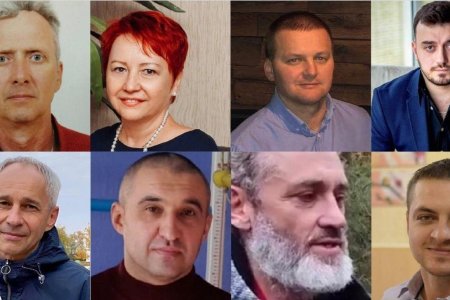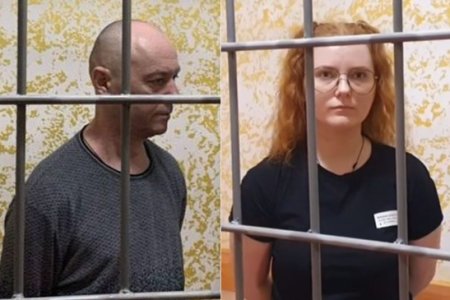
The authoritative Memorial Support for Political Prisoners Project has declared Halyna Dovhopola a political prisoner in a text that is most telling through its sheer brevity. The 69-year-old Ukrainian, we are told, was born on 27 March 1955 and lived in occupied Sevastopol. She was sentenced to 12 years’ imprisonment on 24 March 2021, having been ‘convicted’ by a Russian-controlled ‘court’ of ‘treason’, under Article 275 of Russia’s criminal code. Russia used ‘treason in the form of espionage charges to conceal any information about the actual charges and evidence, or lack of such, to back these. There are, however, ample grounds, including international law, for concluding that both the ‘trial’ of Dovhopola and her imprisonment in Russia are illegal and that she was likely targeted because of her pro-Ukrainian views and publicly expressed opposition to Russian occupation (in an interview to the Ukrainian publication \\Gordon’)..
There are also grounds for serious concern about Halyna’s health. She is almost 70 and seemingly suffered from high blood pressure at the time of her arrest, on 27 November 2019. She has since lost a lot of weight and developed gastritis in the appalling conditions of Russia’s penal institutions. It is most unlikely that she has any access to adequate healthcare.
Suspect timing
Halyna Dovhopola was one of at least four Ukrainians arrested soon after the Kremlin released 35 prominent Ukrainian political prisoners in exchange, mainly, for Volodymyr Tsemakh, an MH17 witness and possible suspect whom Moscow needed to keep from Dutch investigators. The four were seized in different parts of Crimea on apparently different grounds, but all had one thing in common – their openly pro-Ukrainian position in Russian-occupied Crimea.
Dodgy charges
Russia’s use of its legislation against Ukrainians on occupied territory is in clear breach of international law, however the violations do not end here. The aggressor state has made it impossible to live, obtain healthcare, etc. in occupied Crimea, and has then used its foisted Russian citizenship as an excuse for claiming the alleged ‘spying’ to be ‘state treason’. All of these arrests and criminal prosecutions further violate the fundamental right to a fair trial. Dovhopola, for example, was denied any access to an independent lawyer, with the Russian-appointed ‘lawyers’ typically there to sign documents and generally try to persuade their supposed clients to ‘confess to everything’. In occupied Crimea, we know of cases where men were tortured in front of their so-called lawyer, with the latter not reacting at all.
The FSB appear to have claimed that Dovhopola worked for Ukraine’s Military Intelligence [HUR] and that she had carried out “intelligence tasks aimed at gathering information about a separate aviation regiment of the Black Sea Fleet, its call-signals and other information linked with radio communications. This was supposed to have included ‘state secrets, the passing on which could be used to harm the security of the Russian Federation”. It is, in fact, a standard feature of all Russia’s political ‘trials’ of Ukrainians seized on occupied territory that they are accused of working either for HUR or for Ukraine’s Security Service [SBU]. Here it is quite unclear how Halyna Dovhopola, who was 64 when arrested, was supposed to have gained access to such information, even were this to be needed, and not otherwise obtainable, by Ukraine’s Military Intelligence.
Total secrecy
Dovhopola did not have an independent lawyer, and the four hearings in her ‘trial’ at the Russian occupation ‘Sevastopol city court’ were behind closed doors. On 24 March 2020, she was sentenced by ‘judge’ Igor Kochevnikov to 12 years’ imprisonment in a medium-security prison colony. In a letter, she mentioned that there had already been “the show that goes by the name of an appeal court”, so it is likely that she denied the charges. She gave further information about how the FSB staged their gratuitously violent arrest, as well as such chilling details about parts of her interrogation in a Graty interview reported here. In that interview, she confirmed that she had been subjected to physical and psychological pressure. The latter included threats that, if she didn’t sign the ‘confession’ thrust in front of her, that the Russian FSB would somehow trick her daughter into coming to the Lefortovo Prison in Moscow and would take her prisoner also. The FSB typically hold Ukrainian political prisoners and civilian hostages incommunicado, without any access to reliable information, making their victims more likely to believe such essentially empty threats than they might otherwise.
She wrote that she was longing to see her children (seemingly, a son and daughter) and grandchildren, and to be back in Ukraine. She stressed that what she and other political prisoners need is wide publicity and reminders to Ukraine’s government about their plight and the need to secure their release.
“We are waiting here, and each of us is fighting for our life, so that we do not “die in Russia” behind barbed wire. We ask you all not to forget about us! Glory to Ukraine!”
Please write to Halyna Dovhopola!
It is important that she and Moscow know that she has not been forgotten. The letters need to be in Russian and on ‘safe’ subjects (i.e. not about the war or politics). If Russian is a problem, the following would be fine, maybe with a photo or card
Добрый день,
Желаю Вам крепкого здоровья и надеюсь, Вы скоро вернетесь домой, к своим родным. Простите, что мало пишу – мне трудно писать по-русски, но мы все о Вас помним.
[Hi. I wish you good health and hope that you will soon be home, with your family. I’m sorry that this letter is short – it’s hard for me to write in Russian., but you are not forgotten. ]
Address (this can be written in Russian or English)
601395 РФ, Владимирская область, Судогодский район, п. Головино, ул. Советская, 50 «а», ФКУ ИК-1
Довгополой Галине Павловне, 1955 г. р.
Or in English: 601395 Russia, Vladimir oblast, Golovino, 50a Sovietskaya St, Prison Colony No. 1, Unit No. 5
Dolgopolaya, Galina Pavlovna, b. 1995


